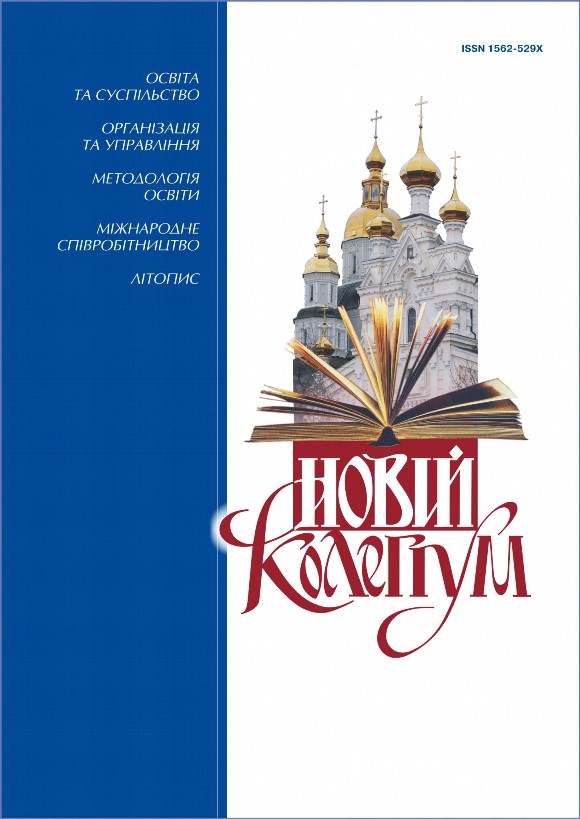Adherence to the principle of natural correspondence according to H. S. Skovoroda in the organization of team interaction among students
DOI:
https://doi.org/10.30837/nc.2023.4.41Keywords:
collective, team, interaction, creation, natural correspondence, Hryhorii SkovorodaAbstract
The idea of natural correspondence is one of the most fundamental in didactics and the personality’s theory of education. According to A. Diesterweg, the principle of natural correspondence is the basic principle of human education, according to which «education should be based on a scientific understanding of natural and social processes by the general laws of nature and society». The article notes that the principle of natural correspondence in education involves taking into account the multifaceted and holistic nature of the student, namely, his or her anatomical, physiological, psychological, age, and genetic characteristics.
It is highlighted that when organizing team interaction of students, it is important to understand the essence and nature of each team member, to take into account the interests and individual characteristics of each, their age and psychological changes, natural abilities, and acquired competencies. When organizing team interaction, for example, when working on a collective creative activity or project, the teacher should take into account the needs, interests, wishes, talents, and skills of everyone to achieve a common goal and the effectiveness of activities inherent in team interaction.
It is noted that working with a team involves, first of all, the identification by the team leader of the personal qualities of each member, creating conditions for the identification of personal talents and potentialities, cooperating and constantly keeping in touch with the families of students, which corresponds to the pedagogical views of H.S. Skovoroda.
Adhering to the views of H. S. Skovoroda's natural correspondence, the article identifies methods of forming team interaction of students: «good» (using fables, parables, philosophical treatises, aphorisms, etc.) instructions, eradication of bad habits, conversation, explanation, example, advice, etc. While forming team interaction of students, it is necessary to consider the natural inclinations and dispositions of each team member as much as possible. And this should be done primarily through the joint efforts of parents, teachers, and society in the unity of mental, moral, and Technology education.
References
Башкір О.І. Собченок Т.М., Цапко А.М. Форми виховної роботи класного керівника в закладах загальної середньої освіти // Педагогіка формування творчої особистості у вищій і загальноосвітній школах : зб. наук. пр. / [редкол. А.В. Сущенко (голов. ред.) та ін.]. Запоріжжя : КПУ. 2020. Вип. 68. 252с. Т.1. URL: http://dspace.hnpu.edu.ua/handle/123456789/4967
Башкір О.І., Денисенко А.О. Особливості командоутворення в хореографічних колективах // Теорія та методика навчання та виховання. 2022. №52. С.9–20. DOI: https://doi.org/10.34142/23128046.2022.52.01
Боченко О.В. Основні ідеї виховання та навчання в творах Григорія Сковороди // Наук. записки кафедри педагогіки. 2014. № 36. С. 65–71.
Гужва О.П. Сковорода: народження ідеї // Вісник Харків. нац. пед. ун-ту імені Г.С. Сковороди. Філософія. 2012. №37. С. 59–71.
Іванов Є.К. Гуманістичні засади виховання Г. С. Сковороди [Електронний ресурс]. URL: http://metodportal.net/system/files/mp/2013/07/20307/kurs.project.skovoroda_copy.pdf.
Кавалерова Н. А., Іванова Н.В. Філософсько-освітні горизонти Григорія Сковороди : монографія. Одеса : Астропринт, 2010. 151с.
Комінарець Т.В., Кучер О.А. Гуманістичні ідеї Г.С. Сковороди в поглядах на виховання особистості // Таврійський вісник освіти. 2013. №1. С. 5–9.
Коцур В. Спадщина Григорія Сковороди як фундамент історико-духовного виховання майбутніх учителів // Освіта і управління. 2004. Т. 7, № 1. С. 91–96.
Сковорода Г. Повне зібрання творів : в 2 т. / [ред. кол: В.І. Шинкарук (гол.) та ін.]. Київ : Наук. думка, 1973. Т. 1. 531с.
Сковорода Г. Сочинения в двух томах. Москва, 1973. Т.2. 483 с.
Стельмахович М.Г. Г. Сковорода і народна педагогіка // Початкова школа. №1. 1996. С. 46–50.
Стогній І.П. Сковорода Григорій: ідейна спадщина і сучасність. Київ, 2003. 716 с.

